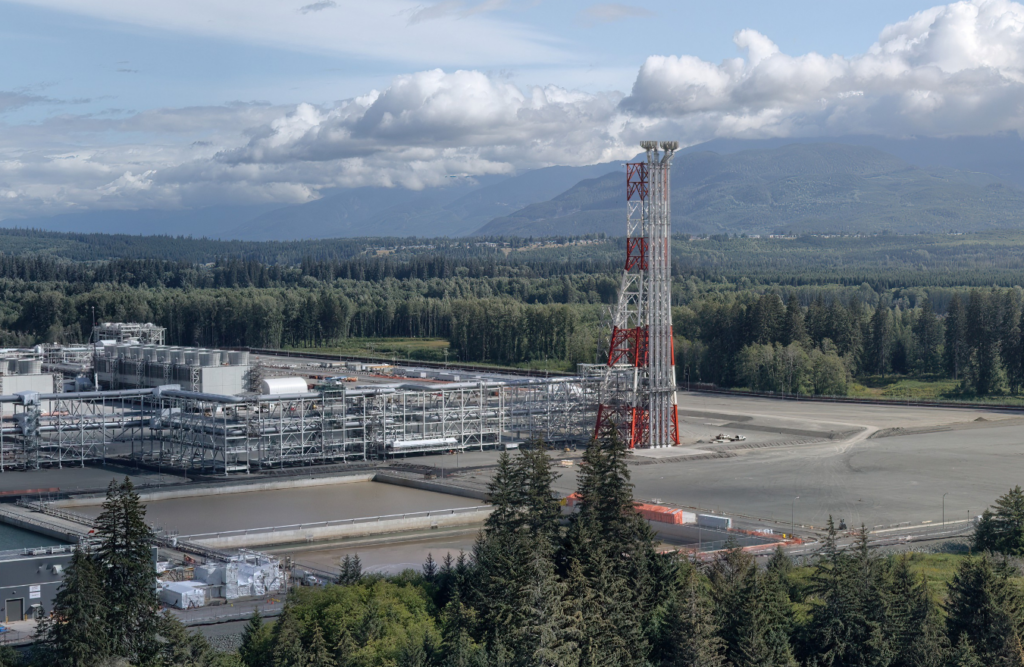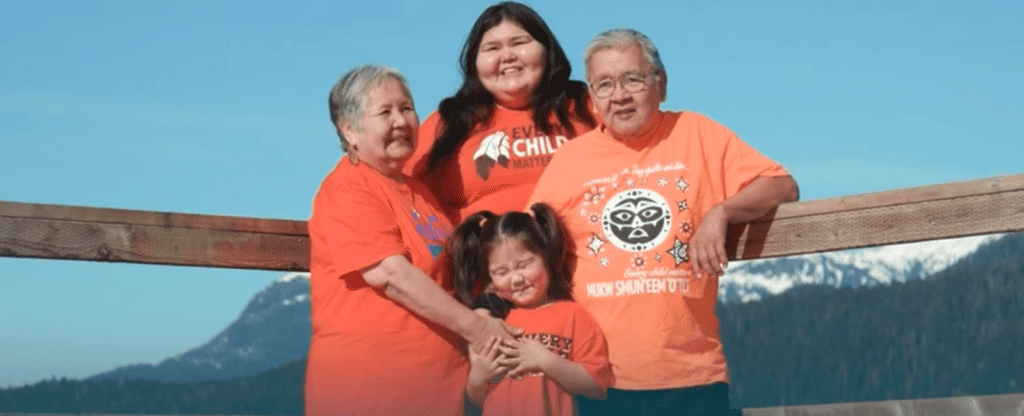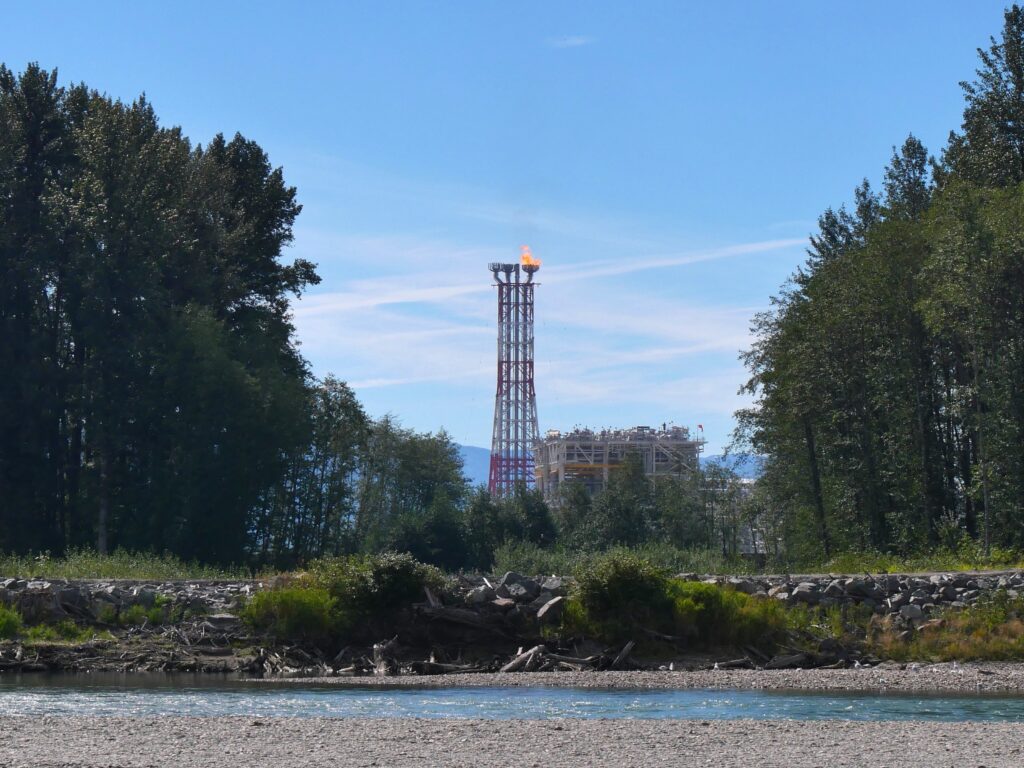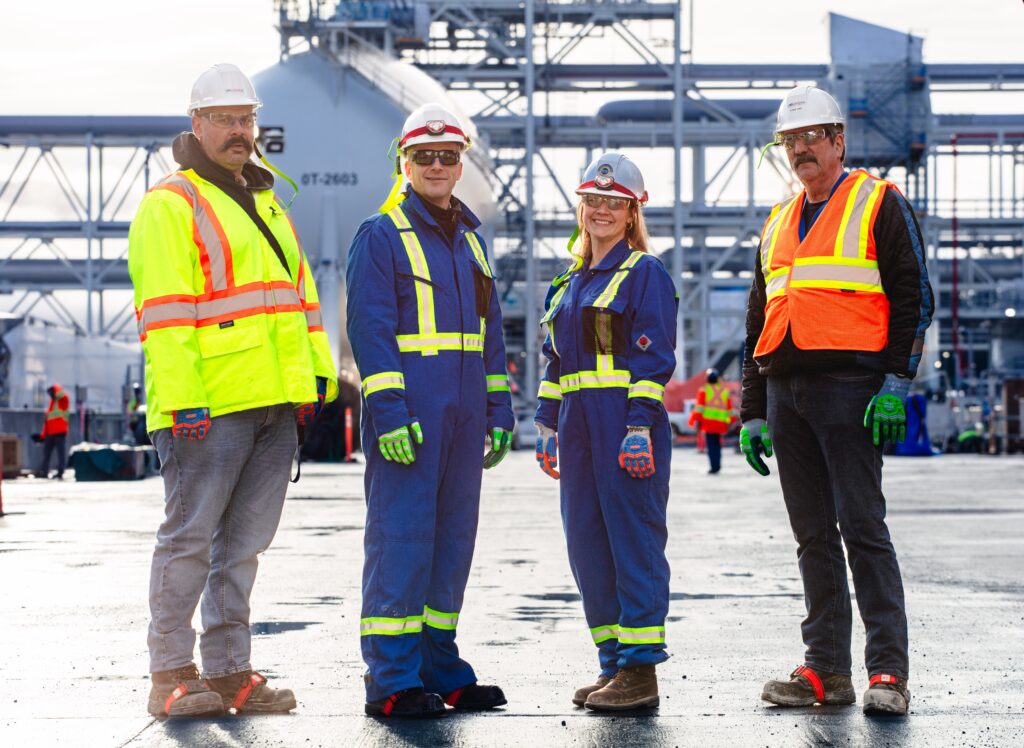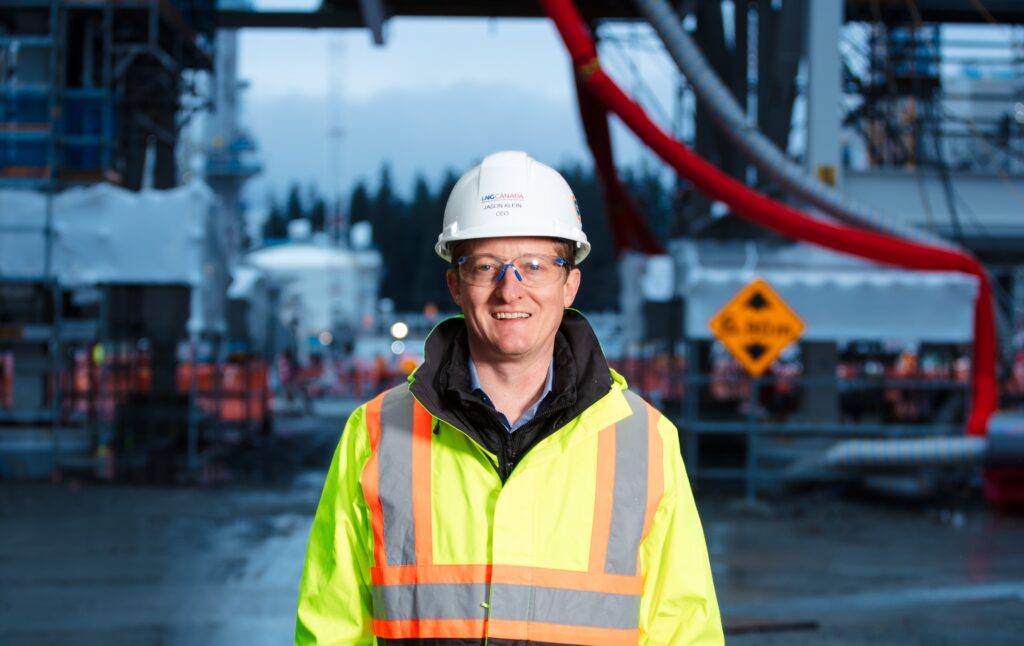Jun 04, 2021
UPDATED: COVID-19 Preparedness FAQs
Share
We have received a number of questions about the precautions LNG Canada and JGC Fluor (JFJV) are taking with respect to COVID-19, at our worksite, our workforce accommodations, and in the local community. We can assure you that together we are taking prudent measures to help stop and reduce the spread of the virus.
Vince Kenny, LNG Canada Construction Manager
Berni Molz, JGC Fluor Construction Director
What actions are being taken in response to the COVID-19 pandemic?
- We are committed to protecting our workers, our project and the community from COVID-19, and to reduce the risk of infection in all areas of our operations and activities
- To live up to this commitment, we implemented the following processes and procedures:
- Continuous enhancement of COVID-19 protocols on site and at workforce accommodations
- Adherence to Orders from Provincial Health Officer, Dr. Bonnie Henry, including the Industrial Projects Restart order
- Ensuring adherence to Industrial Camp Guidance (BC Centre for Disease Control)
- Adherence to safe construction worksite requirements (WorkSafeBC)
- Frequent communication with regulators, Northern Health, stakeholders and communities
- Participation in District of Kitimat COVID -19 Emergency Operations Committee
- Participation in Kitimat Economic Recovery Task Force
- Continuous enhancement of COVID-19 protocols on site and at workforce accommodations
- Adherence to Orders from Provincial Health Officer, Dr. Bonnie Henry, including the Industrial Projects Restart order
- Ensuring adherence to Industrial Camp Guidance (BC Centre for Disease Control)
- Adherence to safe construction worksite requirements (WorkSafeBC)
- Frequent communication with regulators, Northern Health, stakeholders and communities
- Participation in District of Kitimat COVID -19 Emergency Operations Committee
- Participation in Kitimat Economic Recovery Task Force
The LNG Canada Project also has strong measures in place to reduce the risk of transmission of COVID-19, including strict rules and procedures around worker travel to and from the project.
What is LNG Canada doing to reduce COVID-19 risks to the community and workforce?
The following infographic outlines some of the key measures LNG Canada and JGC Fluor (JFJV) are taking to reduce the risk of COVID-19:
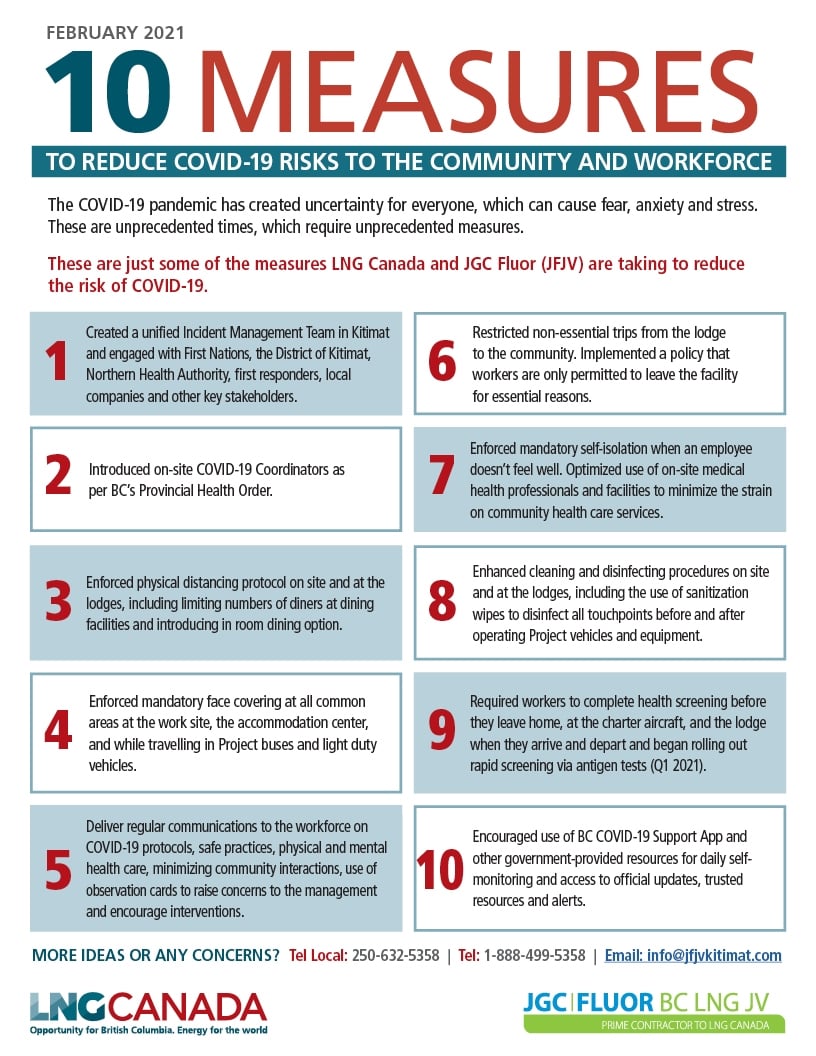
What is LNG Canada doing to reduce the COVID-19 risk associated with commuting to work?
For those people commuting, these are the steps they must take when moving to and from lodging and the worksite:
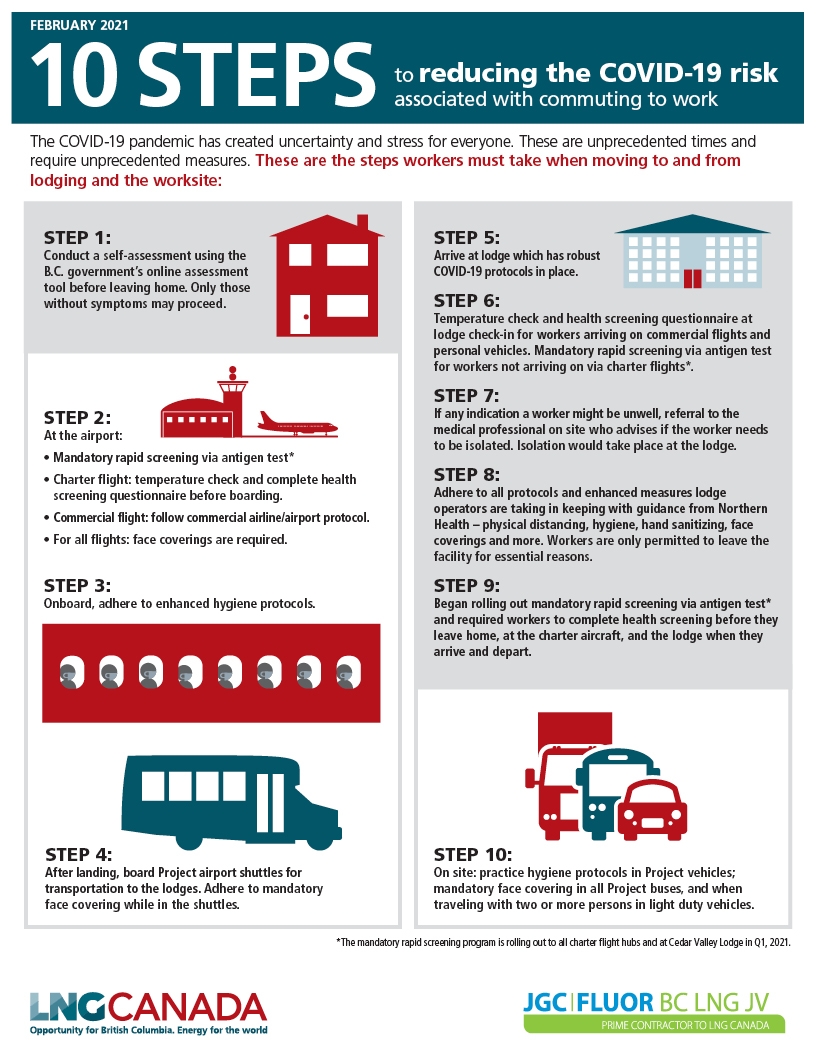
What health services are available at the LNG Canada project site?
The LNG Canada Project site has on-site medical facilities staffed by more than a dozen healthcare professionals and emergency response team members that are available to project workers 24-7.
International SOS (ISOS), a global health and security services firm, operates the project’s on-site medical clinics. ISOS is trained in COVID-19 safety and screening measures as well as care for patients with the virus.
Providing professional medical care at our worksite greatly reduces the need for off-site services. Learn more:
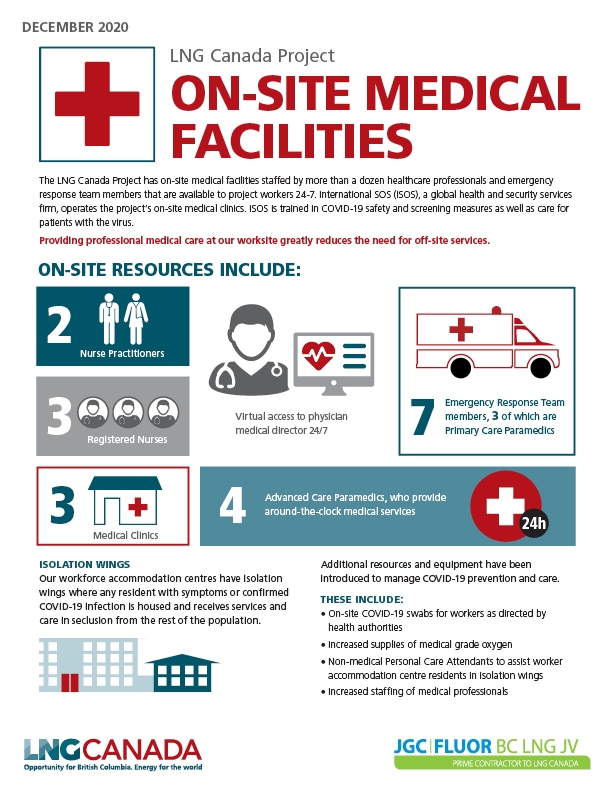
What steps are being taken to protect people living in worker accommodation centres?
We are working closely with all workforce accommodations providers and with Northern Health to understand the potential threat of COVID-19 on the worker population, with a focus on promoting hygiene and preparing for the potential COVID-19 impacts.
All accommodation operators have increased cleaning and sanitizing regiments, and hand washing is mandatory before people enter any dining room and lunchroom areas.
All workers have been directed to use elevated levels of hygiene to reduce their risk of exposure, both personally and at work. This includes frequent hand washing, covering their mouth with a tissue when coughing or sneezing, avoiding touching their face with their hands if they haven’t been washed, and using sanitizing wipes to clean surfaces.
What onus is placed on each worker, with respect to maintaining COVID19-related protocols?
It is constantly reinforced that individuals working at the LNG Canada project site must maintain awareness of their employer’s specific protocols, as each will vary depending on the makeup of their workforce and work scope. It is every employee’s responsibility, per the province’s April 23, 2020 Public Health Order regarding industrial camps, to self-monitor daily for signs and symptoms of illness and to inform their employers and designated coordinators should symptoms develop. In addition, LNG Canada contractors have introduced several of their own reporting tools, such as written symptom forms that are submitted to designated coordinators at specific intervals and swipe-in/swipe-out symptoms reporting at the start and end of each shift.
What sort of self-isolation measures have been introduced?
If an employee does not feel well, they must stay home, or in their lodge room. They must call their supervisor and on-site medical personnel to inform them of their condition. Notwithstanding the B.C. government’s self-isolation advisory which includes both 10-day and 14-day periods, our site has mandated a 14-day self-isolation period. Once a guest vacates a lodge room, the room will be left untouched for a certain period of time before cleaning services commence. The lodges employ a rigorous cleaning and disinfecting regimen to prevent the spread of COVID-19 and other viral respiratory illnesses.
Are workers required to wear personal protective equipment such as masks at site and in lodges?
LNG Canada, our prime contractor JGC Fluor and our subcontractors apply the two-meter physical distance rule and other COVID-19 compliance protocols, at the work site and at the worker accommodation facilities. These measures have been successfully adopted. We require workers and supervisors to evaluate the ability to maintain physical distance while performing work on site. If physical distance cannot be maintained, workers are to wear face coverings to ensure COVID-19 compliance. Face coverings are also made mandatory at all common areas at the lodge and in the trailers.
What about marine transportation? Is there a risk that people aboard ships may bring the virus to shore?
We closely follow Transport Canada guidelines for foreign-flagged shipping. We, and our shipping contractors, adhere to the federal government’s directives, ensuring that crews and shipments travelling between Asia and our project site do not put communities and workers at risk.
Foreign crews arriving at Terminal B do not disembark from the cargo ship when they are in the Port of Kitimat (only exceptions being humanitarian and other events per international conventions, and the Chief Officer and crew undertaking cargo discharge.) Foreign crews to our site are not undertaking crew changes and they are not disembarking from their ship for sightseeing or recreational proposes. This approach mitigates the risk of any potential transmission (of COVID-19 or another virus).
Long-established protocols for visiting ships require them to declare any sick persons onboard, before they arrive in Canada. They must also officially inform government authorities through the 96 Hour PAIR (Pre-Arrival Information Reporting) when seeking permission to enter and berth at a port in Canada. In addition, some shippers have initiated daily health checks for all crew members for the entirety of their sailings. For more information please read Transport Canada’s updated guidelines for health reporting.
Will LNG Canada and JGC Fluor test workers as an additional measure to protect the rest of the workforce and community?
Starting in January 2021, the LNG Canada project will implement mandatory COVID-19 rapid screening, using Antigen tests, in a phased approach for Project employees returning to the worksite in Kitimat.
Is LNG Canada participating in the Northern Health vaccine program for its workers at site?
LNG Canada participates in Northern Health’s worker vaccination program, administering vaccines at our on-site clinic.


